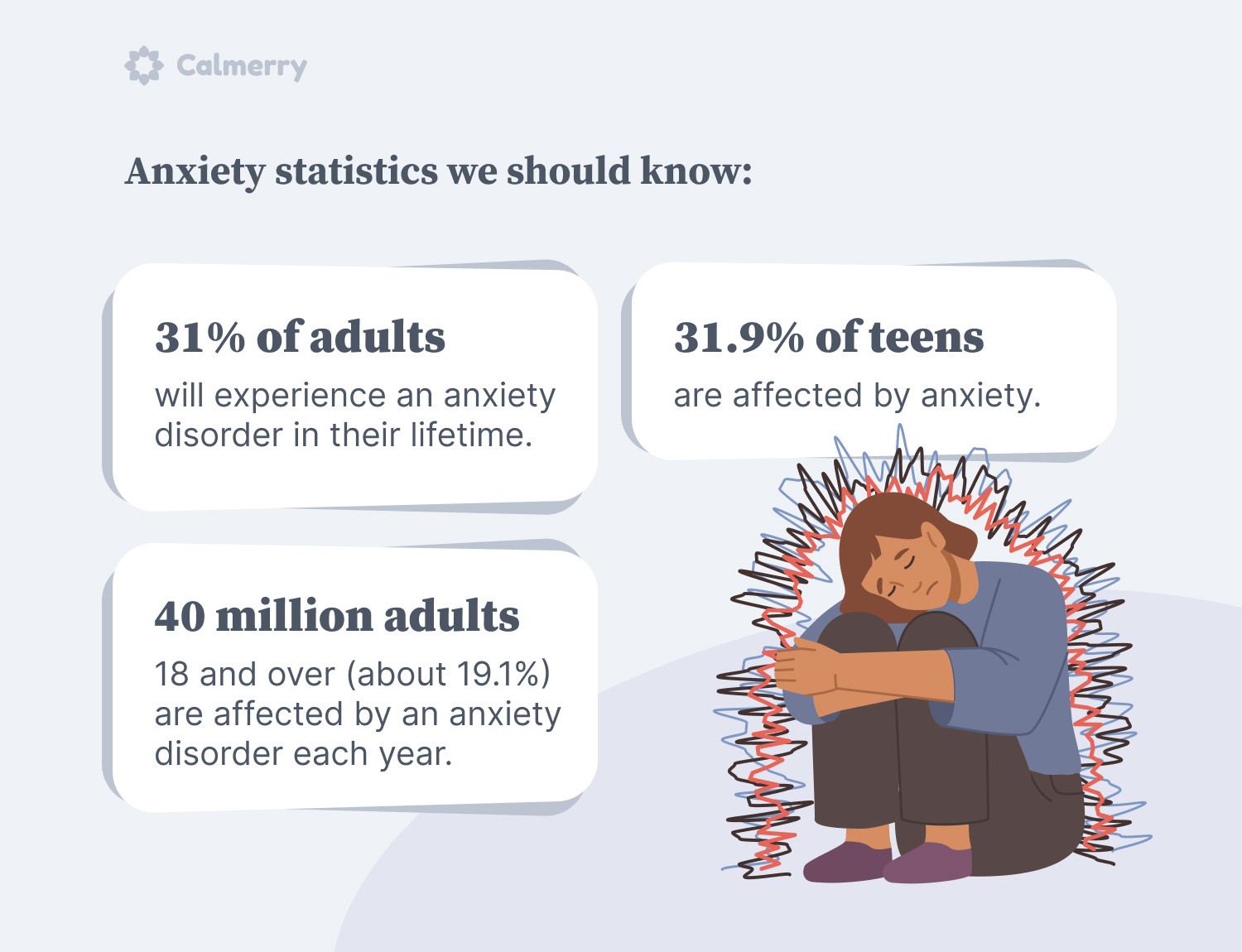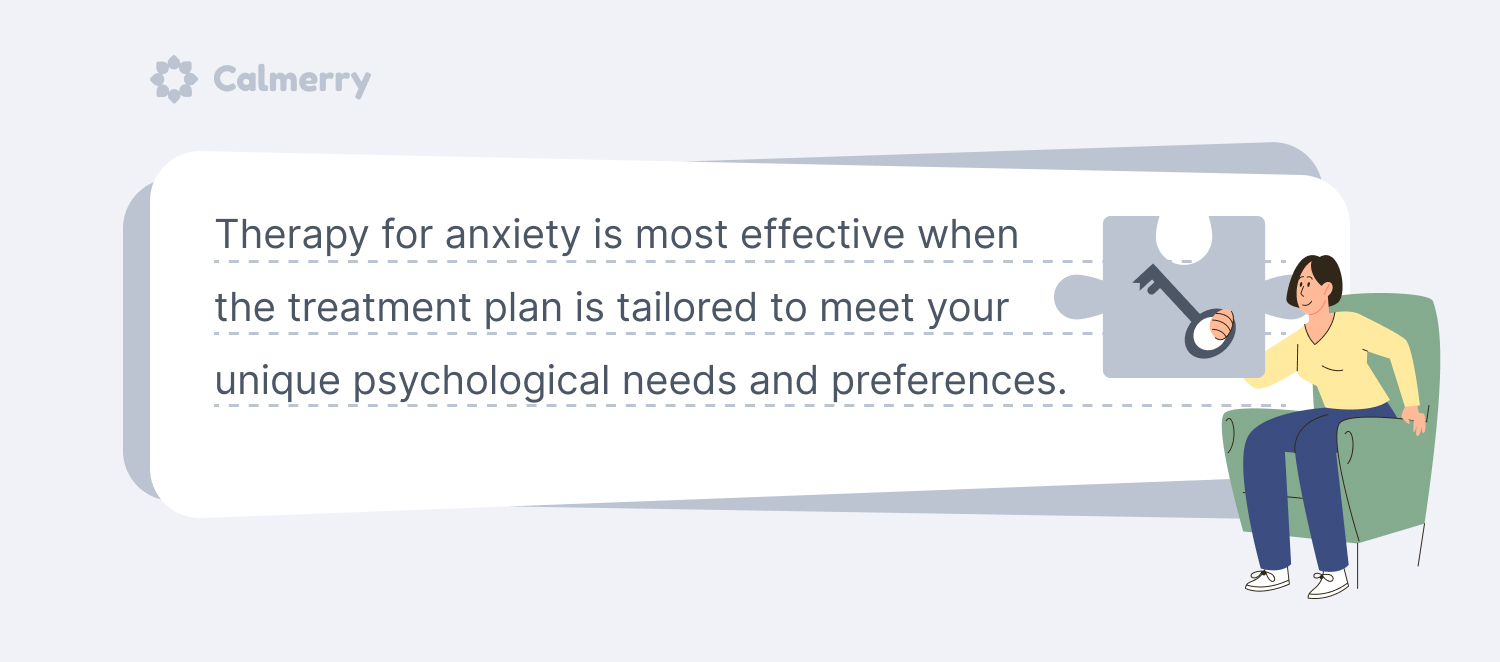Therapy for Anxiety: How It Works, Types, and Effectiveness

In this article
Feeling anxious is something we all experience. New situations, unexpected events, or changes in your life can all leave you feeling unsettled. For most of us, those feelings pass, and we are able to get back on track.
Sometimes though, those feelings of uneasiness, fear, worry, or even dread, stick around. When that happens, it can wreak havoc on your mental health and your ability to manage your world.
When anxiety becomes problematic and interferes with one’s psychological well-being and ability to function, it may be considered to be an anxiety disorder.
Left untreated, anxiety can place you at risk for depression, poor quality of life, insomnia, and substance abuse. There is even evidence that anxiety can create changes in the brain that can impact your cognitive functioning.
If you or a loved one is struggling with anxiety, there is help. Therapy for anxiety can help you understand and learn how to manage your feelings in healthy ways so that you can function at your best.
What is anxiety?
Anxiety is more than just the occasional case of nerves. As defined by the American Psychological Association (APA), “Anxiety is an emotion characterized by feelings of tension, worried thoughts, and physical changes like increased blood pressure. People with anxiety disorders usually have recurring intrusive thoughts or concerns. They may avoid certain situations out of worry. They may also have physical symptoms such as sweating, trembling, dizziness, or a rapid heartbeat.”
Contrary to popular belief, anxiety is not fear, although they can occur together, and the terms are often used interchangeably. Anxiety is a more future-focused, long-acting response to a vague threat. Fear, on the other hand, is an appropriate short-term response to a present, clearly identifiable, and specific threat to one’s safety.
Understanding anxiety disorders and their types
Anxiety disorders are the most commonly diagnosed mental health disorders, affecting about 40 million adults 18 and over (about 19.1%) each year, according to the National Institute of Mental Health (NIMH). It is estimated that about 31% of adults will experience an anxiety disorder in their lifetime.
Anxiety in teens is common as well, with an estimated 31.9% of teens being affected. Teens with untreated anxiety have been shown to be at higher risk for poor academics, missing important social experiences, and substance abuse.
Anxiety disorders can also impact children and the elderly, too.

Anxiety is not a single disorder but rather a group of disorders that share similar features of excessive fear, anxiety, and related behavioral disturbances. These disorders differ as well, each presenting its own unique set of characteristics.
The anxiety disorders include:
Generalized Anxiety Disorder (GAD)
GAD is the kind of anxiety that comes with persistent feelings of dread and the “what ifs.” It’s more than just the occasional worry about daily things or stressful life events. GAD can persist for months or even years.
Panic Disorder
Panic disorder is characterized by sudden bouts of intense fear, physical discomfort, or a sense of losing control, what are known as panic attacks.
Attacks can include a racing heart, trembling, sweating, chest pain, or intense feelings of impending doom. They often occur unexpectedly, even when there is no clear trigger or danger.
Panic attacks are a symptom of panic disorder, but not every person who has a panic attack will develop a panic disorder. People with panic disorder often worry about the next attack and engage in avoidance behaviors to try and prevent an attack.
Separation Anxiety Disorder
This type of anxiety is characterized by a fear of being separated from the people closest to you or something happening to them while you’re separated.
People with separation anxiety will try to avoid being separated. It’s a type of anxiety that is most often associated with children separating from parents, but it can happen with adults too.
Specific Phobias
Phobias are intense fear or aversion to certain things or circumstances. Fear of heights or spiders, or even the dark, are some common examples.
While there is certainly such thing as a healthy fear or avoidance, people with phobias tend to experience reactions that are out of proportion to the actual situation.
Social Anxiety Disorder (aka Social Phobia)
Social Anxiety Disorder is characterized by an intense fear of being in social or performance situations. Fears may include feeling judged or watched or worries about embarrassing oneself.
This anxiety can lead to avoidance of social or performance situations.
Agoraphobia
You might associate agoraphobia with the fear of leaving one’s home, but it’s more than that. Agoraphobia actually requires the presence of two or more of the following:
- Using public transportation
- Being in open spaces
- Being in enclosed spaces
- Standing in line or being in a crowd
- Being outside of the home alone
People with agoraphobia avoid these situations for fear of experiencing panic or other embarrassing symptoms. In extreme cases, people with agoraphobia can become housebound.
Selective Mutism
This rare disorder is characterized by the failure to speak in social situations when the person has the ability to speak. It is most often seen in children under the age of 5, but it can occur in others as well.
It might surprise you that trauma and stress disorders, including post-traumatic stress disorder (PTSD) and acute stress disorder, are not classified as anxiety disorders as they were in previous editions of the DSM. They are now included in the Obsessive Compulsive Related Disorders classification. However, the DSM does recognize the close relationship they share with anxiety disorders, as is reflected in how the DSM5 is organized.
So, anxiety is not the same for everyone. The same holds true for treatment. Therapy is generally considered the first-line treatment for anxiety disorders.
Does therapy help with anxiety? Is it effective?
The short answer is yes, therapy does help with anxiety! The long answer is a little more complex.
Anxiety is a highly treatable mental health issue. Just how effective therapy for anxiety is will vary from person to person. However, the majority of people who seek treatment report partial or full relief of their symptoms after a few months of therapy. Some people even see improvements after just a few sessions.
What are the benefits of therapy for anxiety?
The benefits include:
- Discovering the underlying issues that stoke your worries and fears
- Learning to recognize unhelpful thoughts and actions
- Learning healthier, more effective ways of coping
- Learning how to relax and be less reactive to worries and fears
But can you treat anxiety without medication? This is a common question. The fact is, medication is sometimes used to treat anxiety, most often in combination with therapy. Medication alone only treats symptoms. It doesn’t address the underlying dynamics or help you to learn better ways of coping.
The decision to use medication is a decision to be made with your healthcare provider.
One of the keys to successful treatment is finding the type of therapy that is right for your unique needs. There are a number of well-studied and widely used therapies for anxiety.
Types of therapy for anxiety
Because anxiety isn’t a one-size-fits-all disorder, it should be no surprise that treatment isn’t either. There are several types of therapy for anxiety using a number of therapeutic techniques and interventions, depending on the type of anxiety disorder and the person’s individual needs and preferences.
Here are some of the more well-known and well-researched approaches for treating anxiety disorders.
Cognitive Behavioral Therapy
Cognitive Behavioral Therapy (CBT) is a type of “talk therapy” that focuses on identifying and changing patterns of thinking and behavior. It is one of the most extensively researched approaches to therapy and the foundation for several other therapeutic approaches.
CBT for anxiety has been shown to be quite effective in treating anxiety disorders and has been associated with improved quality of life for people with anxiety disorders.
Exposure Therapy
Exposure Therapy, a form of CBT, is a type of treatment that helps people confront their fears. It is often used to treat phobias, panic disorder, and social anxiety.
In exposure therapy for anxiety, the therapist creates a safe space in which to “expose” the person to what they fear and avoid. Exposure in this safe way helps to reduce fear and avoidance.
Dialectical Behavior Therapy
Dialectical Behavior Therapy (DBT) is an effective approach to treating anxiety disorders that combines cognitive behavioral techniques with mindfulness, acceptance, and dialectical thinking.
Rather than focusing only on the symptoms as a problem to be solved, DBT also focuses on the here-and-now and the acceptance of one’s experiences.
Using four main skills of mindfulness, distress tolerance, interpersonal effectiveness, and emotional regulation, DBT can help you learn to accept your anxiety as you learn skills to change your thoughts and behaviors.
Acceptance and Commitment Therapy
Acceptance and Commitment Therapy (ACT) is a mindfulness-based, values-directed form of therapy. The goal of ACT is to increase one’s psychological flexibility and ability to choose actions that align with one’s values and needs.
ACT has been shown to be helpful in treating anxiety disorders.
ACT therapy works by focusing on accepting experiences as they come, without judgment, and learning compassion and acceptance. This process can help you overcome patterns of obsessive, negative thinking, paving the way for peace of mind and healing.
Interpersonal Therapy
Interpersonal therapy (IPT) is an effective and widely used type of therapy used to treat anxiety, depression, and other issues. IPT involves focusing on the interpersonal dynamics that can create or exacerbate anxiety and working to resolve them.
IPT shifts the focus of therapy from the person to their interpersonal relationships, reducing stigma and encouraging self-empowerment.
What is the most effective therapy for anxiety?
This is the million-dollar question. Each type of anxiety disorder has its own unique characteristics. And each person is unique.
Therapy for anxiety is most effective when the treatment plan is tailored to meet your unique psychological needs and preferences.

Each therapeutic approach has its own process and set of techniques. Some approaches may be a better fit than others.
For example, empirically speaking, CBT is one of the most widely studied and effective approaches, especially for anxiety disorders such as GAD and social anxiety. Exposure therapy has been shown to be especially helpful for panic and specific phobias such as fear of flying or agoraphobia. But it doesn’t mean those are the only ways of treating anxiety.
Your choice of therapist might also shape the direction your therapy takes. Therapists are trained in different modalities and theoretical approaches. And the therapist-client connection, often referred to as the therapeutic alliance, is one of the most powerful factors in the outcome of therapy. A good fit matters.
Offline vs. online therapy for anxiety
Speaking of a good fit…
The last few years have seen a tremendous rise in the availability of options for online counseling for anxiety and other disorders. Gone are the days when you have to call, make an appointment, schedule time off work or school, get childcare, and then trek across town just to see your therapist.
Today, you have more options than ever and can schedule therapy that works on your schedule. Still, the question lingers, “Is online therapy for anxiety as effective as in-person therapy?”
Online CBT for anxiety has been shown to be highly effective, as has internet-based ACT for anxiety. In fact, online therapy has been shown to be effective for a wide range of mental health issues, including anxiety disorders. Online users report positive experiences and positive therapeutic outcomes.
Online therapy comes with benefits that in-office therapy doesn’t:
- Talk to a therapist online when and how it works for you
- Online eliminates barriers such as distance or availability
- You can choose the space that is comfortable for you
- No need to take off work or schedule childcare
What to expect in the first session
They say the first step is always the hardest, and if you’re new to therapy, you might be wondering just what the first session will be like. You might be feeling a little nervous. That’s normal, and it’s OK.
Your first session is when you’ll meet your therapist. Expect that there will be lots of questions. There are no right or wrong answers. Your therapist is simply trying to fully understand what brings you to anxiety treatment and how best to help you.
Honesty is super important. Your therapist can only help you with what you share with them.
With that said, there may be things that you’re not ready to share. That’s OK too. Let your therapist know that there are some issues that are really hard for you to share. They will work with you to find safe ways to share when you’re ready.
The first session is also a time for you to ask questions too. What are things you want to know? Is there something the therapist didn’t ask that you want to share? It’s OK to do that too.
Your first session is laying the foundation for the work you’ll do together.
Getting the most out of your anxiety therapy
Therapy is a process. Sometimes it’s really hard and can bring up big feelings. What do you do with all that between sessions?
- Give yourself grace – It takes time to work through and heal. You won’t resolve everything in a couple of sessions, and that’s OK. Give yourself permission to take your time.
- Do your homework – Your therapist will probably give you some things to do between sessions. The activities are designed to help you continue working and building new skills.
- Practice good self-care – Make time to take care of yourself. Make sure you’re eating and sleeping well. Do things that bring you peace and joy.
- Journal – Carrying big feelings can get heavy. Journaling gives you a place for expressing and exploring those feelings. You may even gain some new insights.
- Practice gratitude – Gratitude is more than just being thankful. Being grateful is an appreciation for the gifts you have, no matter how small. One simple way to practice gratitude is to start each day identifying one thing that you are grateful for. Practicing gratitude helps to cultivate a positive mindset and focus on the present.
FAQs on anxiety therapy
So, when it comes to therapy, the best type of therapy for anxiety is the one that’s right for you. When you’re ready, here are some tips to help you take that first step:
When to see a therapist for anxiety
The time to see someone is when your anxiety becomes bothersome or is impacting your physical or emotional well-being. The sooner you seek help, the sooner you can begin to feel better and get on the road to healing.
What to talk about in therapy for anxiety
Actually, you can talk about anything you want to in a therapy session. Sometimes the conversation will flow. Other times you may struggle to find the words. It’s all OK.
A good place to start is to start where you are:
- How are you feeling at the moment? What’s coming up for you?
- Have you had any insights or breakthroughs since your last session?
- Did you have an experience you want to share?
Who should I see for anxiety?
When choosing a therapist, you want to see a licensed mental health provider who is experienced in treating anxiety. You also want someone that you can relate to and build a good rapport with.
When you’re ready
If your anxiety is keeping you from doing the things you want to do, help is available, and you don’t have to go it alone. Anxiety is highly treatable, and you can start to feel better. Online counseling can be particularly helpful and give you options to fit your needs.
Calmerry has over 500 licensed and experienced mental health professionals who can help people manage their anxiety. Our therapists are trained in CBT, DBT, ACT, IPT, and many other evidence-based approaches and techniques.
When you’re ready, help awaits.
online therapy
live video session



